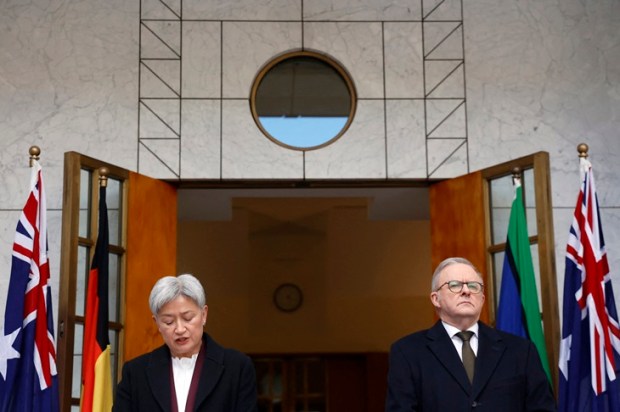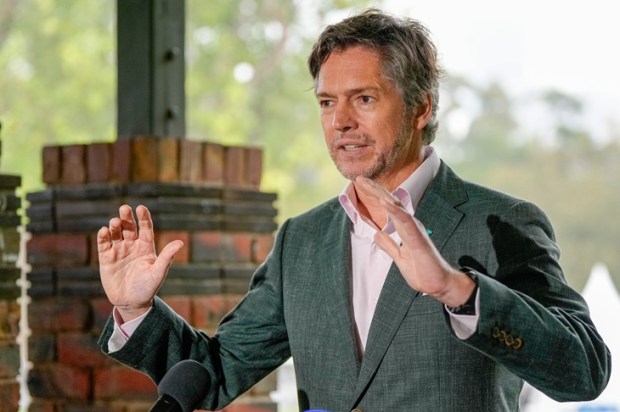Treasurer Jim Chalmers should be too ashamed to show his face in Canberra. Under his watch, Australia has turned into a welfare state. One of the largest in the world. The ‘Venezuela of the Pacific’ is no longer a joke. It is a Budget reality.
While Chalmers throws ‘productivity roundtables’ around to distract the Opposition and occupy the media headlines with false hope, we must remain focused on the dreadful truth: over half of our fellow Australians depend on government income to survive.
Whether they work for the public service, cash in grants, rely on welfare, or swim around in the endless rivers of NDIS spending … their survival is a cost to someone else’s productivity.
This has gone well beyond providing basic services and overreached genuine social need.
Our economy is in a hostage situation with Labor.
And they are going to keep it duct-taped to the chair until every last cent is gone.
This is not simply a matter of Labor’s outrageous election bribes, such as wiping student debt from a privileged academic class funded by over-taxing the working class.
(A habit both Labor and the Coalition will have to repeat.)
It is structural. It is growing. It is paralysing the private sector which cannot survive under the burden of the public sector.
We have seen a shift in the way people think. Australians once begged in the street for jobs, equating work with dignity. Thanks to the socialist virus which has infested Australia, people believe the government owes them a living and that the so-called ‘rich’ exist to have their finances redistributed.
That is the headline argument, at least, but the reality is far worse. Engage in a conversation online and it becomes clear the welfare state is not about exploiting the ‘rich’ as a form of class vengeance, it is ideological vengeance against capitalism in general. The point is to bankrupt the market. If you work in the private sector, your money belongs to the collective. This delusion damages the ability of Australia to recover, especially when it is fed by opportunist politicians.
As Robert Carling writes at the Centre for Independent Studies:
‘A culture of dependency and entitlement has taken root in the population and political behaviour has become only too willing to accommodate and encourage it in a feedback loop.’
Describing a situation where people expect to be financed, forever, by someone other than themselves, he adds, ‘A vast network of lobby groups and organisations has evolved to safeguard and increase social spending. A large proportion of the population has become dependent on government for a living, either through public sector employment or the spread of social benefits.’
In Canberra they call the lobbyists ‘sharks’.
Not only do they circle the cafes in Parliament, waiting to ensnare vulnerable staffers, they door-knock, relentlessly, like dodgy scammers or unsolicited advertising texts.
Overturning this widespread welfare dependency means depriving voters of their income, which is unpopular. Politicians only do unpopular things if it involves attacking a minority identity group that belongs to the Opposition. Like Jim Chalmers and his super cash grab.
Once more than 50 per cent of the electorate is living off the state, it becomes nearly impossible to implement a swift legislative fix, which is where Australia is now.
This happened on a smaller scale during Covid, where lockdowns created a group of unemployed people who were re-employed in government-funded roles. These jobs were tied to the pandemic. The political class, afraid of a backlash, extended the pandemic and these jobs well beyond their natural limits and it was done at the expense of the wider economy. It was a major reason Australia incurred excessive levels of debt and still, today, businesses are collapsing having never been able to recover the injuries they suffered from that time. Imagine how long this situation would have dragged on for without the rest of the world intervening to restore sanity.
It is too late, politically, to cut the public service or launch Royal Commissions into the waste of public money in the activist industry.
We need an intervention stronger and more revolutionary.
Given where we are now, the only solution is for the government to deliberately unleash the private sector and let it out-compete the public purse.
The government must eliminate excess regulation.
Drop fees and charges.
Re-introduce flexible work arrangements.
Slash business, payroll, and income taxes.
Make it more lucrative for people to leave welfare or exit their public jobs and join the private industry.
People have to know that they will be allowed to keep the money they earn and that living off the back of their own work is the most effective way to live comfortably.
The Treasury will suffer a temporary loss, but it will be in exchange for a major future gain.
And a future that doesn’t include people burning money in the streets for warmth.
If the government waits too long, the private sector will stop functioning entirely and the government will endure emergency corporate handouts as we are already seeing in heavy industries impacted by Net Zero policy and its associated energy costs.
There is a point at which the million individual actions that keep the economy ticking over stop. Where there are too many errors or missing parts. Services and skills that no longer exist.
This will happen to food, transport, retail … everything.
Reviving the private sector through legislation slowly rebalances the scales without kicking people into poverty. If anything, they are enriched.
However, the lobbyists, activists, and bureaucrats will fight to Australia’s death to keep their enormous salaries alive.
They need millions of Australians to worship at the feet of social dependency otherwise they have no excuse to exist. Bureaucracies are charities for those with a gender studies degree. These are the institutions that should be targeted by the Opposition.
Markets are designed to fix the problems caused by runaway collectivism, but it takes courage, strength, and clarity of mind.
We are yet to see a Coalition in recent decades with enough distance from its own public-sector-funded side projects to truly help the Australian people. To save the Quiet Australians, the Coalition must crucify those within its extended circle who are addicted to public money, and then do the same to those in Labor, the Greens, and the Teals.
Instead of walking out in a pink dress suit, championing a feminist agenda, Sussan Ley would have been better suited for the first day of Parliament in Blue Ribbon blue, promising reform.
Can the problem of a welfare state be solved? Yes.
Will Labor do it? Absolutely not.
Is the Coalition prepared to try? It seems very unlikely.
We do not have a class divide in this country, we have a welfare rift tearing the economy apart and through its cracks is spilling all the simmering disagreements and grievances people normally contain. Albanese’s government went and poured a million migrants over the vents which exploded like scalding steam across the capital cities.
Everyone has been burned by this approach. Now it is time to heal.
Flat White is written by Alexandra Marshall. If you would like to support her work, shout her a coffee over at donor-box.

























